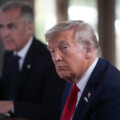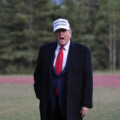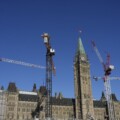As the federal Liberal Party meets this weekend in Ottawa for its biennial policy convention, there are reports that a small group of party members is ringing the alarm bells about the party’s decline at the provincial level across the country.
The basic concern is straightforward: since the Trudeau government took office in 2015, the trend across the provinces has been conservative consolidation. With centre-right parties currently leading eight of ten provincial governments and the B.C. Liberals changing their name to distance themselves from the federal party, there’s a good case that the Liberal brand in provincial capitals is at something of a low point.
But a narrow reading of election results and parliamentary representation may underestimate the power and influence of Liberal politics on provincial policymaking in the Trudeau era. Election victories have, by and large, been replaced by the federal spending power. The outcome in terms of provincial policymaking has essentially been the same.
It’s not hyperbole to say that at the same time that provincial Liberal parties have declined in their popularity and standing, the Trudeau government has gone about systematically shaping provincial policymaking across the country. Just consider that most of its biggest policy accomplishments fall squarely within provincial jurisdiction. An expansive use of the federal spending power has effectively given the Liberal Party what it hasn’t been able to achieve itself at the provincial ballot box.
It’s not a bad trade when one thinks about it. Winning provincial elections across Canada’s diverse political landscape is a pretty inefficient means of gaining control of the levers of provincial policymaking. It’s far more efficient to guide them through the federal spending power—especially when it’s paid for with deficit-financed dollars.
There’s plenty of evidence that it’s working. Think of it this way: in any single province—with the exception of Quebec—who has had a more powerful role in shaping the policy agenda in recent years: the provincial government or the prime minister?
The answer lies in the fact that Alberta premier Danielle Smith is currently running on the prime minister’s $10-per-day childcare idea. In December 2021, before she was premier, Smith wrote an op-ed in which she argued that the federal-provincial deal that she now champions was an example of how “conservatism is becoming indistinguishable from liberalism…[because] it’s given total control to Ottawa over how we deliver child care.” Sixteen months later, she has effectively outsourced her government’s childcare policy to the most progressive prime minister in modern history. The federal spending power can create strange bedfellows.
But it doesn’t just have political consequences. It also manifest itself in deeper issues for Canadian federalism. We’ve grown accustomed in recent years to a progressive conception of federalism that subordinates issues of national power and elevates social welfare priorities that generally reside at the provincial and local levels.
The old tension between “guns versus butter” has been decidedly resolved in favour of butter. The Trudeau government has used the federal spending power—including in the form of various bilateral agreements with the provinces—to boost public spending on childcare, dental care, health care, public infrastructure, and social housing. That this expansion of the welfare state has occurred during a period of heightened national security threats and in the face of growing evidence that our NATO allies are losing their patience with Canada’s parsimonious defence spending doesn’t seem to have given Ottawa any pause.

This week The Hub published two articles that reflect the broader consequences of these policy trends. The first by Mark Johnson lamented the growing tendency towards a “banker” federalism whereby the provinces come to Ottawa in search of more federal dollars in order to avoid trade-offs or tough choices within their own jurisdictions. The second by Jack Granatstein lamented the lack of Canada’s basic military capabilities including the Trudeau government’s failure to deliver on its own modest peacekeeping commitments. These laments are of course interrelated. Banker federalism has contributed to a hollowing out of state capacity at the federal level.
There’s always been a degree to which Ottawa’s fidelity to the division of powers is susceptible to political temptation. Legal scholar Asher Honickman’s notion of a federalism of “watertight compartments” is a compelling ideal but one that’s rarely manifested itself in practice. But this feels like something different. We have a national government today that has little interest in federal power but big ambitions for the provinces. As I’ve written before, we essentially have a Section 92 politics in a Section 91 moment.
The consequences for the country’s capacity to protect itself from foreign interference or contribute to global security or even process passports are indeed alarming. But the Liberals are wrong to be alarmed about their recent struggles at the provincial level. The Trudeau government has effectively made provincial parties obsolete. The real power now lies with the prime minister.
Recommended for You

The Notebook by Theo Argitis: Carney’s One Big Beautiful Tax Cut, and fresh budget lessons from the U.K.

Christopher Snook: Is Canada sleepwalking into dystopia?

Rudyard Griffiths and Sean Speer: The fiscal hangover from the One Big Beautiful Bill hits Canada

‘A fiscal headache for Mark Carney’: The Roundtable on how Trump’s One Big Beautiful Bill could affect Canada




